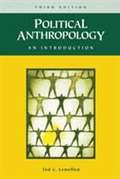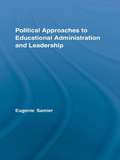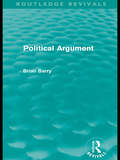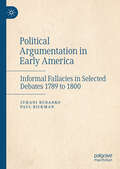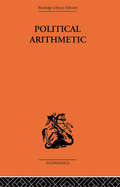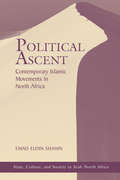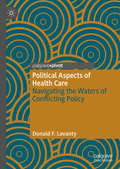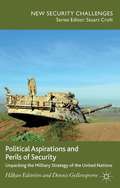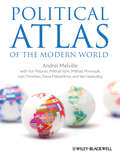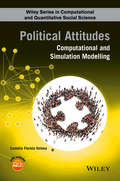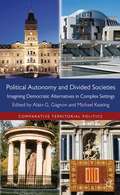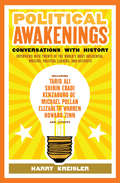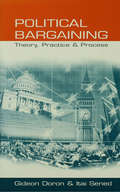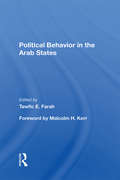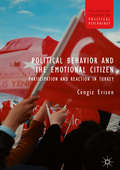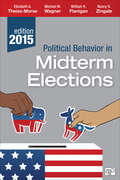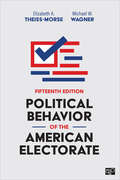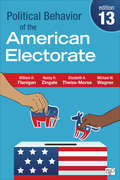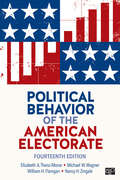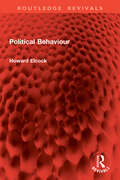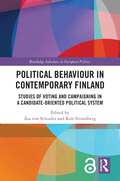- Table View
- List View
Political Anthropology: An Introduction
by Ted C. LewellenIn the foreword to the first edition, renowned anthropologist Victor Turner wrote that this book was a succinct and lucid account of the sporadic growth of political anthropology over the past four decades . . . the introduction we have all been waiting for. Unique in its field, this book offers a comprehensive overview of political anthropology, including its history, its major research findings, and its theoretical concerns both past and present. The third edition has been significantly updated and expanded, with extensive changes in many chapters, two new chapters, a new Preface that replaces the Introduction of the first two editions, an updated Glossary and Suggested Readings list, and an expanded Bibliography. In a clearly written style, this introduction also provides the background necessary for further study. The new chapters cover such topics as the politics of identity, and the transition from modernism to postmodernism. As with the earlier editions, this third edition of what has become a classic in the discipline still serves as a basic text and structure for a full course.
Political Approaches to Educational Administration and Leadership (Routledge Research in Education)
by Eugénie A. SamierThis collection explores the political philosophy and theory foundations for educational administration and leadership as they influence our understanding, analysis and practice in the field. The first section, "Political Philosophy: The Foundations," discusses the work of such writers as Machiavelli, Kant and Hegel, Hayek, Habermas, and Bourdieu as their theories apply to the educational context. The second section, "Political Analysis: The Critique," examines various types of political analyses, such as the politics of the policy process, minority politics, civil society, micro-politics, community politics, and cosmopolitan theory. The last section, "Current Political Controversies: The Practice," addresses current topical issues of a political nature, including the serving of the state economic agenda, the democratisation of educational organisations, the neo-conservative agenda, and globalisation. The broad international perspective from which these topics are covered makes this volume an excellent addition to the fields of educational leadership, organizational studies, and educational administration theory.
Political Argument (Routledge Revivals)
by Brian BarrySince its publication in 1965, Brian Barry's seminal work has occupied an important role in the revival of Anglo-American political philosophy. A number of ideas and terms in it have become part of the standard vocabulary, such as the distinction between "ideal-regarding" and "want-regarding" principles and the division of principles into aggregative and distributive. The book provided the first precise analysis of the concept of political values having trade-off relations and its analysis of the notion of the public interest has also been significant.
Political Argumentation in Early America: Informal Fallacies in Selected Debates 1789 to 1800
by Juhani Rudanko Paul RickmanThis book investigates the language used by protagonists in four major political debates in the early history of the United States. The first of these concerns the controversy in the first United States House of Representatives in the summer of 1789 on whether a proposal for a bill of rights should be considered in an expeditious fashion or whether the issue should be left till much later. The second is the principal debate on whether a sedition act should be enacted in July 1798, and the third concerns the enactment of the Logan Act of 1799. The fourth investigates the elections for the Legislature of the State of New York in the spring of 1800, which was the key event affecting the outcome of the presidential election of 1800. In each case there was a sharp disagreement between groups of politicians representing different points of view, and each event was significant from the point of view of the political history of the United States. The authors introduce these four debates, as well as the notion of informal fallacy - taken to designate an argument that is unsatisfactory in some way - before analysing deceptive fallacies and demonstrating how fallacy theory can be used as a critical tool in the examination of political argumentation. This book will be of interest to students and scholars of political communication, rhetoric and argumentation, US history and politics, and diachronic linguistics, especially diachronic pragmatics.
Political Arithmetic: A Symposium of Population Studies
by Lancelot HogbenEncompassing the areas of economics, sociology, social biology and genetics, and drawing on studies from the UK and Australia, this volume charts and analyses the factors affecting population growth. Chapters include:* The international decline in fertility* The changing structure of the family* Educational opportunities* Concepts of race.
Political Ascent: Contemporary Islamic Movements In North Africa
by Emad Eldin ShahinIslamic movements in North Africa have historically been distinguished from their counterparts in other parts of the Arab world because they have demonstrated a marked willingness to work within the political system and have at times even been officially recognized and allowed to participate in local and national elections. As a result, Islamic thinkers from the Maghrib have produced important writing about the role of Islam and the state, democracy, and nonviolent change. In this book, Emad Shahin offers a comparative analysis of the Islamic movements in Algeria, Tunisia, and Morocco, exploring their formation and expansion in the late 1960s and the tenets of their ideology for social transformation. }Islamic movements in North Africa have historically been distinguished from their counterparts in other parts of the Arab world because they have demonstrated a marked willingness to work within the political system and have at times even been officially recognized and allowed to participate in local and national elections. As a result, Islamic thinkers from the Maghrib have produced important writing about the role of Islam and the state, democracy, and nonviolent change. In this book, Emad Shahin offers a comparative analysis of the Islamic movements in Algeria, Tunisia, and Morocco, exploring the roots of their development, the nature of their dynamics, and the tenets of their ideology. He argues that the formation and expansion of Islamic movements since the late 1960s has come in response to the marginalization of Islam in state and society and to a perceived failure of imported models of development to resolve socioeconomic problems or to incorporate the Muslim belief system into a workable plan for social transformation. }
Political Aspects of Health Care: Navigating the Waters of Conflicting Policy
by Donald F. LavantyAs a consultant for healthcare associations working on all the healthcare laws from Medicare, the Health Manpower Act, Budget Reconciliation, Clinton healthcare efforts and the Affordable Healthcare Act, Donald Lavanty had a front-row seat from which to witness the politics and policies motivating each action. This volume was written from that experience, which was first documented in the course on the Political Aspects of Healthcare, employing the analogy that these various legislative actions to connect the system are like attempting to build a canal connecting the Amazon and Nile rivers: a long and difficult process. The title examines ongoing efforts to create and maintain a workable solution to the conflicts inherent in the US healthcare system from all angles, conflicts that arise due to the nature of our democratic government in which healthcare policies change based on the position of the voting majority in Congress at the time any action is taken.
Political Aspects of Social Indicators: Implications for Research (Social Science Frontiers #Vol. 4)
by Peter J. HenriotComplementing the focus on the structural and social-psychological aspects of measuring social change, this report establishes a research approach relating social measurement to antecedent and consequent political considerations: political values, policy impact, power consequences, administrative influences, institutionalization, and so forth. This study is directed to any social scientist interested in political phenomena and in the issue of the relationship between social science and public policy.
Political Aspirations and Perils of Security
by Håkan Edström Dennis GyllensporreThis book comprises of a range of case studies of military strategy, based on UN documents, observing and concluding the effectiveness of each individual case. Edstrom and Gyllensporre analyse the UN's military strategy, its consequences and its potential to fulfil political ambitions.
Political Atlas of the Modern World: An Experiment in Multidimensional Statistical Analysis of the Political Systems of Modern States
by Andrei MelvilleThe Political Atlas of the Modern World is a unique reference source which addresses these questions by providing a comparative study of the political systems of all 192 countries of the world. Uses quantitative data and multidimensional statistical analysis Ranks countries according to five indices of political development: stateness, external and internal threats, potential of international influence, quality of life, institutional basis of democracy Illustrated throughout with tables and diagrams.
Political Attitudes: Computational and Simulation Modeling
by Camelia F. VoineaPolitical Attitudes: Computational and Simulation Modeling Camelia Florela Voinea, Department of Political Science, International Relations and Security Studies, University of Bucharest, Bucharest, Romania Political Science has traditionally employed empirical research and analytical resources to understand, explain and predict political phenomena. One of the long-standing criticisms against empirical modeling targets the static perspective provided by the model-invariant paradigm. In political science research, this issue has a particular relevance since political phenomena prove sophisticated degrees of context-dependency whose complexity could be hardly captured by traditional approaches. To cope with the complexity challenge, a new modeling paradigm was needed. This book is concerned with this challenge. Moreover, the book aims to reveal the power of computational modeling of political attitudes to reinforce the political methodology in facing two fundamental challenges: political culture modeling and polity modeling. The book argues that an artificial polity model as a powerful research instrument could hardly be effective without the political attitude and, by extension, the political culture computational and simulation modeling theory, experiments and practice. This book: Summarizes the state of the art in computational modeling of political attitudes, with illustrations and examples featured throughout. Explores the different approaches to computational modeling and how the complexity requirements of political science should determine the direction of research and evaluation methods. Addresses the newly emerging discipline of computational political science. Discusses modeling paradigms, agent-based modeling and simulation, and complexity-based modeling. Discusses model classes in the fundamental areas of voting behavior and decision-making, collective action, ideology and partisanship, emergence of social uprisings and civil conflict, international relations, allocation of public resources, polity and institutional function, operation, development and reform, political attitude formation and change in democratic societies. This book is ideal for students who need a conceptual and operational description of the political attitude computational modeling phases, goals and outcomes in order to understand how political attitudes could be computationally modeled and simulated. Researchers, Governmental and international policy experts will also benefit from this book.
Political Autonomy and Divided Societies
by Michael Keating Alain-G. GagnonAn all star cast of academic experts offer an important and timely analysis of the pursuit of autonomy. They argue that it is key to move beyond the primarily normative debate about the rights or wrongs of autonomous regions on the basis of cultural concerns, instead focusing on understanding what makes autonomy function successfully.
Political Awakenings: Conversations with History
by Harry KreislerA &“remarkable collection&” of insight and inspiration from 20 leaders and thinkers, including Elizabeth Warren, Howard Zinn, and Oliver Stone (Publishers Weekly, starred review). As a kid, Noam Chomsky handed out the Daily Mirror at his uncle&’s newsstand on 72nd Street, inadvertently finding himself in a buzzing intellectual and political hub for European immigrants in New York. Iranian human rights Nobelist Shirin Ebadi and her husband signed their own legal contract, attempting to restore equality to their marriage after the Iranian Revolution effectively erased the legal rights of women. Elizabeth Warren set out to expose those frauds declaring bankruptcy and taking advantage of the system—only to discover, in her research, a very different story of hard-working middle-class families facing economic collapse in the absence of a social safety net. While studying at Oxford, a young Tariq Ali made a bet with a friend that he could work the Vietnam War into every single answer on his final exams. In this rousing, thoughtful, often funny, and always inspiring volume, a diverse and impressive group of thinkers reflect on those formative experiences that shaped their own political commitments. A fascinating new window into the revealing links between the personal and the political, Political Awakenings will engage readers across generations. &“Fascinating.&” —Booklist
Political Bargaining: Theory, Practice and Process (Political Theory Ser.)
by Itai Sened Mr Gideon DoronThis book brings an exciting and innovative new approach to the study of politics today. It introduces political bargaining, a process at the heart of all political and economic exchanges in contemporary society and the very essence of politics itself, to provide a new framework and fresh insights to modern political science. The authors trace the prevalence of bargaining processes in politics from the abstract level of individual human interaction and the `state of nature' to the more concrete political or institutionalized level. They introduce students to theory -- the basic models of game theory, rational choice theory and positivist approaches; practice -- the practical manifestations of political bargaining in everyday national and international political life; and process -- its setting, the interests of the players involved, the conditions and properties that affect their calculations and, consequently, their ability to obtain desired outcomes. Political Bargaining provides students with the basic tools for learning about and participating in politics today by richly illustrating how the authoritative allocation of scarce resources is arrived at through a complex bargaining process between competing interests in society. It will be essential reading for student and lecturer alike across political science and the social sciences more widely.
Political Behavior In The Arab States
by Tawfic E FarahThis vivid portrayal of political and social behavior in the Arab states offers new perspectives to the student and scholar of the Middle East. It also illustrates the effectiveness of survey research as an analytical tool for investigating political, social, and economic problems in Arab societies. The only book of its kind—dealing in a comprehensive and interdisciplinary fashion with the political and social behavior of individuals in the Arab world—it fills a gap in the materials available for courses on the Middle East.
Political Behavior and the Emotional Citizen
by Cengiz ErisenThis book studies the role of emotions, such as anger, anxiety, and enthusiasm, across various domains of political behavior in Turkey. The author considers how emotions affect evaluations of leadership performance, levels of intolerance, likelihood of following and participating in politics, perceived threats from terrorism, and electoral decisions, including vote choice. Using a nationally representative survey and experimental data, this study empirically analyses the causal associations among the primary factors explaining the Turkish electorate's political attitudes and behaviours. The book will be of particular interest to academics, university students, and policymakers seeking to learn more about contemporary Turkish politics amid the recent political and social turmoil that has affected all parts of this society.
Political Behavior in Midterm Elections
by William H. Flanigan Nancy H. Zingale Professor Elizabeth A. Theiss-Morse Michael W. Wagner"What do the 2014 midterm elections mean?" Political Behavior in Midterm Elections: 2015 Edition, the essential supplement to Political Behavior of the American Electorate, provides the answers. Authors Elizabeth Theiss-Morse, Michael W. Wagner, William H. Flanigan, and Nancy H. Zingale draw on the most recent National Election Study surveys to offer a close analysis of the key issues and races, including: the outcome of the battle for control of the Senate, including races in Iowa, Colorado, Kansas, and Alaska; the role of independents in elections, particularly in this era of partisan polarization; the influence of record campaign spending on election outcomes; and whether supporting President Obama’s major programs helped or hurt members of Congress. The perfect update to the classic text, Political Behavior of the American Electorate, by Flanigan, Zingale, Theiss-Morse, and Wagner, the 2015 edition of Political Behavior in Midterm Elections is available free to students when packaged with the text.
Political Behavior in Midterm Elections
by William H. Flanigan Nancy H. Zingale Professor Elizabeth A. Theiss-Morse Michael W. Wagner"What do the 2014 midterm elections mean?" Political Behavior in Midterm Elections: 2015 Edition, the essential supplement to Political Behavior of the American Electorate, provides the answers. Authors Elizabeth Theiss-Morse, Michael W. Wagner, William H. Flanigan, and Nancy H. Zingale draw on the most recent National Election Study surveys to offer a close analysis of the key issues and races, including: the outcome of the battle for control of the Senate, including races in Iowa, Colorado, Kansas, and Alaska; the role of independents in elections, particularly in this era of partisan polarization; the influence of record campaign spending on election outcomes; and whether supporting President Obama’s major programs helped or hurt members of Congress. The perfect update to the classic text, Political Behavior of the American Electorate, by Flanigan, Zingale, Theiss-Morse, and Wagner, the 2015 edition of Political Behavior in Midterm Elections is available free to students when packaged with the text.
Political Behavior of the American Electorate
by Michael W. Wagner Elizabeth A. Theiss-MorseThe 2020 elections took place under intense political polarization, uncertain economic conditions, a global pandemic, and social unrest. Political Behavior of the American Electorate, Fifteenth Edition, attempts to answer your questions around the above topics by interpreting data from the most recent American National Election Study to provide a thorough analysis of the 2020 elections and the current American political behavior. Authors Elizabeth Theiss-Morse and Michael Wagner continue the tradition of Flanigan and Zingale to illustrate and document trends in American political behavior with the best longitudinal data available. The authors also put these trends in context by focusing on the major concepts and characteristics that shape Americans’ responses to politics. In the completely revised Fifteenth Edition, readers will explore support and opposition to the Black Lives Matter movement, discuss post-election attitudes about the January 6th attempted coup, examine misinformation and the beliefs in QAnon, and dissect reports on public assessments of President Trump′s handling of the COVID-19 pandemic.
Political Behavior of the American Electorate
by Michael W. Wagner Elizabeth A. Theiss-MorseThe 2020 elections took place under intense political polarization, uncertain economic conditions, a global pandemic, and social unrest. Political Behavior of the American Electorate, Fifteenth Edition, attempts to answer your questions around the above topics by interpreting data from the most recent American National Election Study to provide a thorough analysis of the 2020 elections and the current American political behavior. Authors Elizabeth Theiss-Morse and Michael Wagner continue the tradition of Flanigan and Zingale to illustrate and document trends in American political behavior with the best longitudinal data available. The authors also put these trends in context by focusing on the major concepts and characteristics that shape Americans’ responses to politics. In the completely revised Fifteenth Edition, readers will explore support and opposition to the Black Lives Matter movement, discuss post-election attitudes about the January 6th attempted coup, examine misinformation and the beliefs in QAnon, and dissect reports on public assessments of President Trump′s handling of the COVID-19 pandemic.
Political Behavior of the American Electorate
by William H. Flanigan Nancy H. Zingale Professor Elizabeth A. Theiss-Morse Michael W. WagnerThe 2012 elections took place in a time of intense party polarization and a weak economy, yet the incumbent president won reelection. How did Obama pull off his victory? New authors Elizabeth Theiss-Morse and Michael Wagner continue the tradition of Flanigan and Zingale by using American National Election Study data to provide a thorough analysis of the 2012 elections and of American political behavior more generally. The authors explore get-out-the-vote efforts and the reasons people voted the way they did, as well as the nature and impact of partisanship, issues, and news media coverage in 2012—all with an eye toward understanding the trends that led up to the election.
Political Behavior of the American Electorate
by William H. Flanigan Nancy H. Zingale Professor Elizabeth A. Theiss-Morse Michael W. WagnerThe 2016 elections took place under intense political polarization and uncertain economic conditions, to widely unexpected results. How did Trump pull off his victory? Political Behavior of the American Electorate, Fourteenth Edition, attempts to answer this question by interpreting data from the most recent American National Election Study to provide a thorough analysis of the 2016 elections and the current American political behavior. Authors Elizabeth Theiss-Morse and Michael Wagner continue the tradition of Flanigan and Zingale to illustrate and document trends in American political behavior with the best longitudinal data available. The authors also put these trends in context by focusing on the major concepts and characteristics that shape Americans’ responses to politics. In the completely revised Fourteenth Edition, you will explore get-out-the-vote efforts and the reasons people voted the way they did, as well as the nature and impact of partisanship, news media coverage, and other issues in 2016—all with an eye toward understanding the trends that led up to the historic decision.
Political Behavior of the American Electorate
by William H. Flanigan Nancy H. Zingale Professor Elizabeth A. Theiss-Morse Michael W. WagnerThe 2016 elections took place under intense political polarization and uncertain economic conditions, to widely unexpected results. How did Trump pull off his victory? Political Behavior of the American Electorate, Fourteenth Edition, attempts to answer this question by interpreting data from the most recent American National Election Study to provide a thorough analysis of the 2016 elections and the current American political behavior. Authors Elizabeth Theiss-Morse and Michael Wagner continue the tradition of Flanigan and Zingale to illustrate and document trends in American political behavior with the best longitudinal data available. The authors also put these trends in context by focusing on the major concepts and characteristics that shape Americans’ responses to politics. In the completely revised Fourteenth Edition, you will explore get-out-the-vote efforts and the reasons people voted the way they did, as well as the nature and impact of partisanship, news media coverage, and other issues in 2016—all with an eye toward understanding the trends that led up to the historic decision.
Political Behaviour (Routledge Revivals)
by Howard ElcockFirst published in 1976, Political Behaviour provides a systematic introduction to the methods and findings of the behavioural approach to the study of politics. Howard Elcock describes the subject matter of political sociology and the methodological problems to which it gives rise. He examines the behaviouralist’s claim to scientific status as an observer of society using precise techniques of measurement and research.Throughout, the discussion of theory is accompanied by the empirical data that will allow the student to evaluate issues and arguments for himself. The author considers general concepts such as political culture, socialization, participation, power and authority as well as the areas of politics to which sociological students of the subject have contributed most- the stability of political regimes, the process of political socialization, power and influence in local authorities and electoral behaviour. This book will be immensely helpful for the students of political science and political sociology.
Political Behaviour in Contemporary Finland: Studies of Voting and Campaigning in a Candidate-Oriented Political System (ISSN)
by Kim Strandberg Åsa Von SchoultzThis book presents a comprehensive overview of Finnish electoral democracy, expertly detailing both its typical representation of a stable European party democracy and its particularities such as a personalized electoral system, a fragmented party system with tradition of grand government coalitions and its sensitive geopolitical location.Using the Finnish National Election Study as a basis, it analyses how voters act and react in an electoral democracy characterized by a high degree of competition between and within parties, yet a democracy in which the possibility for voters to hold governments accountable for their actions is weak, leading to interesting tensions within the system and influences on how voters relate to and engage in politics. This book not only describes these patterns but also provides the reader with thorough explanations and interpretations from a team of expert contributors.This book will be of key interest to scholars and students of Finnish politics, Nordic/Scandinavian politics and studies, political behaviour, electoral studies, public opinion and more broadly to comparative politics and democracy.
